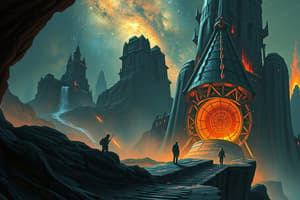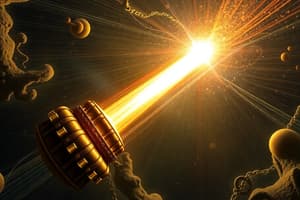Podcast
Questions and Answers
Who is credited with inventing the AC electricity generation and distribution system?
Who is credited with inventing the AC electricity generation and distribution system?
- Alexander Graham Bell
- Galileo Galilei
- Thomas Edison
- Nikola Tesla (correct)
Which inventor conducted pioneering research on wireless communication and radar?
Which inventor conducted pioneering research on wireless communication and radar?
- Nikola Tesla (correct)
- Galileo Galilei
- Thomas Edison
- Alexander Graham Bell
Who founded the Bell Telephone Company and laid the groundwork for the telecommunications industry?
Who founded the Bell Telephone Company and laid the groundwork for the telecommunications industry?
- Galileo Galilei
- Nikola Tesla
- Thomas Edison
- Alexander Graham Bell (correct)
Which inventor is known for establishing the first industrial research laboratory in Menlo Park, New Jersey?
Which inventor is known for establishing the first industrial research laboratory in Menlo Park, New Jersey?
Who is associated with inventing the incandescent light bulb, transforming indoor lighting?
Who is associated with inventing the incandescent light bulb, transforming indoor lighting?
Which inventor is linked to conducting extensive research in hearing and speech, developing hearing devices?
Which inventor is linked to conducting extensive research in hearing and speech, developing hearing devices?
Who is credited with inventing the telescope in 1609?
Who is credited with inventing the telescope in 1609?
Which inventor was born in Pisa, Italy, in 1564?
Which inventor was born in Pisa, Italy, in 1564?
Who made significant contributions to the development of alternating current (AC) systems?
Who made significant contributions to the development of alternating current (AC) systems?
Which scientist faced persecution from the Catholic Church for their scientific beliefs?
Which scientist faced persecution from the Catholic Church for their scientific beliefs?
Who discovered Jupiter's moons and proved Kepler's laws of planetary motion?
Who discovered Jupiter's moons and proved Kepler's laws of planetary motion?
Which scientist was born in Smiljan, Croatia (then part of the Austro-Hungarian Empire)?
Which scientist was born in Smiljan, Croatia (then part of the Austro-Hungarian Empire)?
Flashcards are hidden until you start studying
Study Notes
Science Inventors
Science has led to numerous innovations and advancements throughout history. The contributions of various individuals have been instrumental in shaping modern society. This article explores four prominent figures: Galileo Galilei, Nikola Tesla, Alexander Graham Bell, and Thomas Edison. Each of these science inventors made significant strides in their respective fields, paving the way for future discoveries.
Galileo Galilei
Born on February 15, 1564, in Pisa, Italy, Galileo Galilei is considered one of the most influential scientists in history. He made groundbreaking observations using his telescope, which he invented in 1609. His work laid the foundation for modern astronomy. Some of his notable achievements include:
- Observing the phases of Venus, thus proving Copernicus's theory of heliocentrism
- Discovering Jupiter's moons and proving Kepler's laws of planetary motion
- Studying the stars and establishing the solar system as we know it today
Galileo's work is crucial to our understanding of physics and astronomy. Despite facing persecution from the Catholic Church for his scientific beliefs, he continued to make revolutionary discoveries until his death on January 8, 1642.
Nikola Tesla
Nikola Tesla was born on July 10, 1856, in Smiljan, Croatia (then part of the Austro-Hungarian Empire). He was an electrical engineer who contributed significantly to the development of alternating current (AC) systems and electromagnetism. Tesla holds over 300 patents focusing on various aspects of radio transmission and electric power technology.
Some of Tesla's key accomplishments include:
- Developing the AC electricity generation and distribution system, which is more efficient and safer than direct current
- Inventing remote control technology, which has become ubiquitous in modern life
- Conducting pioneering research on wireless communication and radar
Tesla passed away on January 7, 1943, leaving behind a legacy as an inventor whose ideas continue to impact innovation.
Alexander Graham Bell
Alexander Graham Bell was born on March 3, 1847, in Edinburgh, Scotland. Known for inventing the telephone, Bell played a significant role in revolutionizing global communication. He also conducted extensive research in hearing and speech, developing hearing devices and working with the deaf community.
Bell's major accomplishments include:
- Inventing the telephone and patenting it on March 7, 1876
- Founding the Bell Telephone Company and laying the groundwork for the telecommunications industry
- Pioneering the field of audiology through his work on hearing and speech therapy
Bell died on August 2, 1922, having left behind a lasting impact on communication technologies.
Thomas Edison
Thomas Alva Edison was born on February 11, 1847, in Milan, Ohio. He became known as America's greatest inventor, contributing to the development of practical applications of science, including phonographs, projectors, radios, and carbon microphones.
Edison's primary achievements include:
- Establishing the first industrial research laboratory in Menlo Park, New Jersey
- Developing the incandescent light bulb, which transformed indoor lighting
- Inventing the phonograph, revolutionizing music recording and playback
Despite suffering from deafness from childhood and losing much of his hearing during his lifetime, Edison's innovative spirit did not falter. He continued to invent until his death on October 18, 1931.
Studying That Suits You
Use AI to generate personalized quizzes and flashcards to suit your learning preferences.




